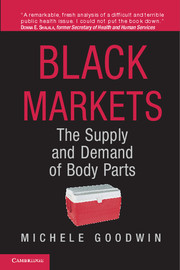Book contents
- Frontmatter
- Dedication
- Epigraph
- Contents
- Miscellaneous Frontmatter
- Preface
- Acknowledgments
- BLACK MARKETS
- PART ONE UNDERSTANDING THE STRAIN ON ALTRUISM
- PART TWO LEGAL FRAMEWORKS AND ALTERNATIVES
- 5 The Uniform Anatomical Gift Act
- 6 Presumed Consent: The Unsuspecting Donor
- 7 Commoditization: Incentives for Cadaveric Organ Harvesting
- 8 Black Markets: The Supply of Body Parts
- PART THREE CRITIQUING THE SLAVERY AND BLACK BODY MARKET COMPARISON
- Notes
- Bibliography
- Index
7 - Commoditization: Incentives for Cadaveric Organ Harvesting
from PART TWO - LEGAL FRAMEWORKS AND ALTERNATIVES
Published online by Cambridge University Press: 14 September 2019
- Frontmatter
- Dedication
- Epigraph
- Contents
- Miscellaneous Frontmatter
- Preface
- Acknowledgments
- BLACK MARKETS
- PART ONE UNDERSTANDING THE STRAIN ON ALTRUISM
- PART TWO LEGAL FRAMEWORKS AND ALTERNATIVES
- 5 The Uniform Anatomical Gift Act
- 6 Presumed Consent: The Unsuspecting Donor
- 7 Commoditization: Incentives for Cadaveric Organ Harvesting
- 8 Black Markets: The Supply of Body Parts
- PART THREE CRITIQUING THE SLAVERY AND BLACK BODY MARKET COMPARISON
- Notes
- Bibliography
- Index
Summary
The federal government has long had rules governing the trade and use of blood and organs. But the extraction and use of things like bones, veins, corneas, ligaments, and sperm by nearly 150 companies have largely gone unregulated.
INTRODUCTION
This chapter proposes a market solution to address organ demand. As described earlier in the book, a cadaveric market that coexists with altruistic procurement will reach potential organ “owners” who are otherwise skeptical and reluctant to participate in the altruistic system. This chapter argues that incentives for cadaveric organ donation would be pareto superior were a market to be legalized. Pareto superior requires that in a market transaction for limited social goods, that at least one person be made better off and that no one be made worse off. The application of this principle fits squarely within the debate about the efficient procurement and distribution of organs. Our challenge is to procure a sufficient supply of organs to make transplantation an efficient mode of saving lives and valuing autonomy, respecting individual (and collective rights) of everyone, but especially marginalized groups, and maximizing transplantation access.
It must be noted, however, that some scholars believe that pareto superior is a likable fiction and that no one can be made better off without making someone worse off (i.e., pareto inferiority). In this context, opponents of a market might argue that such transactions are inferior because they coerce poor people to alienate family members and degrade personhood. It is also likely that they could suggest that organ purchasers are also “worse off” because they have degraded themselves in the process, like buying sex fromaprostitute. Such situations are said to violate the purchaser's dignity; he, the argument follows, is requiring that another (the prostitute) subordinate her autonomy and personhood to satisfy a prurient, selfish (sexual) desire.
Yet, unlike pareto inferior transactions, which make someone worse off to make someone better, in these unique transactions the social resources distributed (organs from deceased persons) help to save sick patients’ lives in an open transaction that promotes individual and collective autonomy. By collective autonomy, I am referring to cultural groups, such as Black Americans, who speak to broader, shared concerns. The comparison between prostitution and organ alienation overstates the goals of organ transactions and undervalues the social good that results.
- Type
- Chapter
- Information
- Black MarketsThe Supply and Demand of Body Parts, pp. 149 - 168Publisher: Cambridge University PressPrint publication year: 2006



